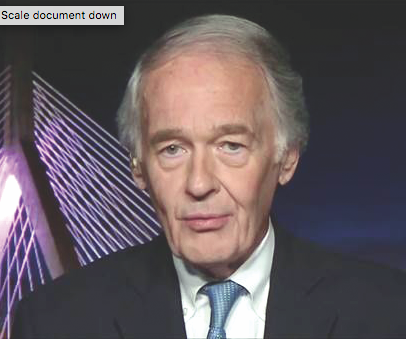September 5, 2019

Reporter Staff
The Irish International Immigrant Center (IIIC) is leading local protests against the Trump administration’s termination of so-called “deferred action” for medical and humanitarian cases, which the agency says will hurt immigrant patients, including some visiting Boston for live-saving treatments.
The IIIC hosted a Aug. 26 event at its Boston office in conjunction with the Massachusetts Immigrant & Refugee Advocacy Coalition (MIRA) and the American Immigration Lawyers Association of New England. Senator Edward Markey was on hand to denounce the order, which was issued on August 7.
“We are here to raise our voices about this inhumane policy which Donald Trump has propounded in the name of the American people,” said Sen. Markey. “It is unconscionable, it is wrong and we will fight.”
Markey called out the administration's immigration policies and called the termination of deferred action out of step with the nation’s identity.
“Over the past two-and-a-half years, President Trump has used every tool at his disposal to inflict harm on immigrants and chip away at our nation’s identity of being refuge to those in need,” he said.
Anthony Marino, director of the Legal Center at the IIIC, said the agency learned of the decision from impacted families.
“Last week, for reasons I will never comprehend, families we represent with pending applications began receiving notices that their requests had been denied. No individual consideration given to any of them. The notices simply indicated that the consideration of any application had been halted entirely— no matter the circumstances.”
Dr. Sarah L. Kimball, a primary care clinician with Boston Medical Center’s Immigrant and Refugee Health Program, said that even children with severe illnesses are being given just 33 days to leave or face deportation.
“In this case, halting medical deferred action is yet another policy change that will cause harm to my immigrant patients, which is why I’m here today,” Kimball said, “Without medical deferred action we are leaving children and their parents with no options, and without it there is no space in our immigration law for us to make a humanitarian exception in cases of medical need.”
According to Kimball deferred action is not a pathway to US citizenship and it’s not easily granted. It is defined by the US Citizenship and Immigration Services (USCIS) as “a discretionary determination to defer a deportation of an individual as an act of prosecutorial discretion.”
“In the past when my patients have applied for medical deferred action it was generally because they believed that going home would mean dying due to inability to access medical care,” Kimball said.
Rev. Dieufort J. Fleurissaint delivered a perspective from the Hatian community at the IIIC news conference. Fleurissaint translated for a Haitian woman named Marie, who shared the story of her 13 year-old son who suffers from sickle cell anemia.
Marie came to visit the US in 2013, when her son fell ill and began receiving treatment in Boston for the disease. It took four years— until 2017— when Marie’s request for deferred action was approved.
“I saw Hatiains die of sickle cell disease, because they don’t have any resources to treat them,” Marie said.
On August 19, 2019, Marie received a letter from the US Department of Homeland Security stating that her deferred action had been revoked.
Carol Rose, executive director at the American Civil Liberties Union of Massachusetts, spoke about prospects for legal action against the administration's decision moving forward.
“We will stand up to this cruel, inhumane and unlawful policy,” Rose said, “it depends on all of us to do our jobs in shining a light on this. The fact that the Trump administration tried to do this in secret demonstrates why it’s so important that the media shine the spotlight on what this administration is doing.”
As of Monday, Rose said that the ACLU has filed more than 200 lawsuits against the Trump administration following the termination of deferred action for medical cases.

